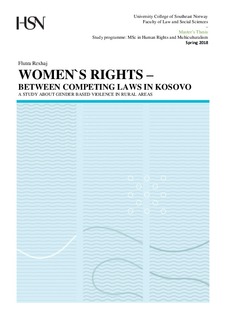| dc.description.abstract | Women´s rights in Kosovo has undergone drastic changes during the last decade. After the civil war in 1999, the international community settled down to rebuild Kosovo, based on the universal human rights. The national law was made in 2008, and reflects the international model of modern ideas of democracy. However, the problem arises when Kosovo´s cultural background is not compatible to the universal human rights which are included in the Constitution. It rather relates to the Kanun of Lekë Dukagjini, an ancient law grounded on patriarchal norms. This law is based on the traditions, custom and the behaviors of Albanian people. Especially, Albanians in rural areas, consider this law as their cultural heritage which has become part of their identity. From this view, Albanian women seem to live their lives caught in between the demands of two relevant laws. On one side the traditional honor and shame values codified in the Kanun, and on the other side the universal human rights values embedded in the national law. For women and GBV victims this causes conflict between self-preservation and fulfilling their identities as wives, mothers and members of their families and communities. The aim of this research is to examine the role of the Kanun in rural areas, and how this affect GBV and the possibilities for gender equality. In order to reach the aim, a qualitative research method is used. I have interviewed both Elders, preserving the Kanun and women who have experienced GBV, representing the sphere ‘caught in-between’. The findings are further analyzed with relevant theories I present on Previous Research and Relevant Theoretical Framework. In my research I found out that the Kanun, which contains traditions and social norms, is an example on how culture is preserved and internalized in the life experiences of my selected informants. However, my main focus is on how women who have experienced GBV can free themselves from the struggle and violent sphere they consider cultural lifestyles | nb_NO |
